Some of the places I have most enjoyed visiting over the past few months have been the remote little hill towns which can only be reached by taking a minivan through a series of snake-like roads that take you round and round as you slowly ascend up the mountains. I’m not staying I enjoy getting there – that’s the part where I close my eyes, hold on to the front seat, and pray while the bus driver plays chicken with other vehicles, seemingly oblivious to the cliff on the lefthand side – however, once that is over and I am back on solid ground, these destinations are exactly my kind of place.
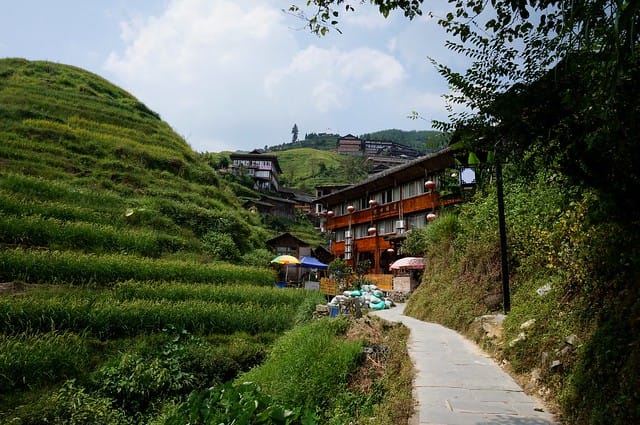
Remote Hillside Town
Like with many of the hillside towns I had previously visited (the Cameron Highlands and Sapa come to mind), getting to Longji wasn’t easy. Overturned trucks could sporadically be spotted on the side of the road and there were a few occasions where we nearly ran a pedestrian or two over. However, in spite of this, our tour guide insisted that we had nothing to worry about, “Your driver is master – 25 years driving experience!” Sure he is…
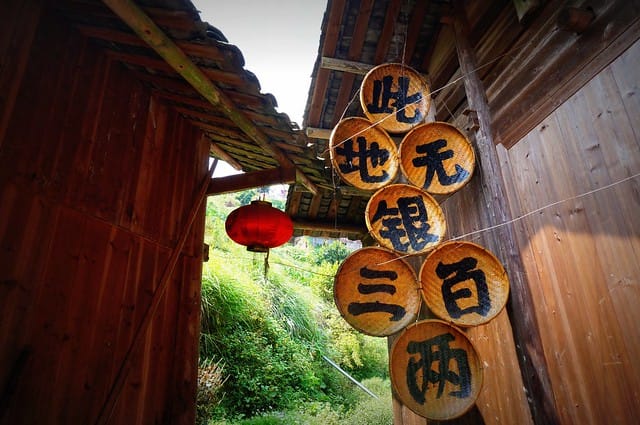
Well, we did make it to Longji in the end albeit I don’t have the photos of sweeping rice terraces to prove it. You see, by the time we finished visiting the Huangluo Yao Village (which is home to the women with the longest hair in the world!) it was high noon and the sun was scorching! Sam and I made it about halfway up the ‘dragon’s back’ (aka Longji) before we admitted defeat and settled for exploring the town which was at the halfway mark.
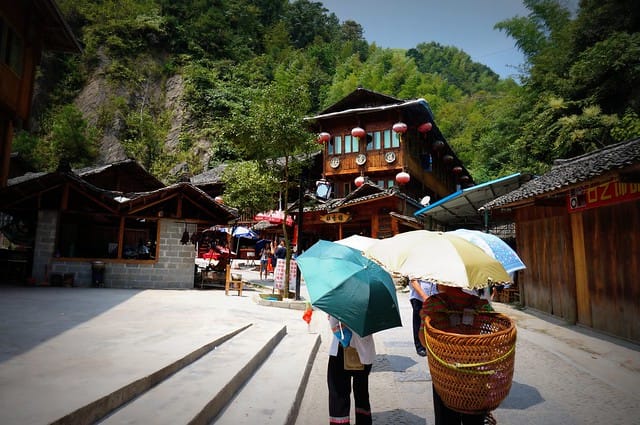
So today instead of rice fields, you get to see the little town of Ping’An.
Practical Longji Guide: When to Go, Where to Hike, and How Not to Miss That Postcard View
Choose Your Season Wisely
Longji’s terraces change costumes every few weeks, so timing is everything.
| Month | Landscape Palette | Pros | Cons |
|---|---|---|---|
| Late Apr – Mid-May | Silver mirrors – paddies just flooded | Fewer crowds, dramatic reflections at sunrise | Trails muddy; leeches in forest sections |
| Mid-May – June | Neon chartreuse seedlings | Rice-planting festivals, drumming & folk dances | Humid; afternoon thunderstorms |
| July – Aug | Deep-emerald “dragon scales” | Cool nights in the hills (20 °C) | Peak domestic tourism = room rates jump |
| Sep – Oct (Golden Week) | Liquid gold harvest | Warm light perfect for photos; farmers drying grains in lanes | Need to pre-book buses & inns a month out |
| Nov | Rust-red sheaves + morning mist | Crisp air, hotpot tastes better | Terrace irrigation drained, some trails closed |
| Dec – Feb | Frosted terraces (occasional snow) | Ethereal if you love quiet & fireplaces | Limited buses, chilly rooms, few cafés open |
My pick: first two weeks of October – golden paddies and post-holiday calm.
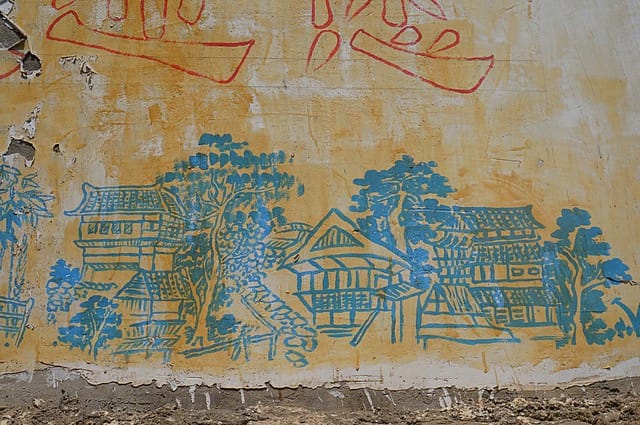
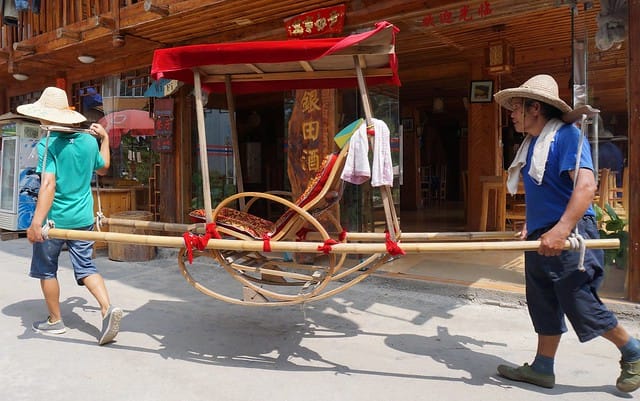
Route Cheat-Sheet (Three Option Menu)
| Route | Distance / Time | Who It Suits | Highlight |
|---|---|---|---|
| Ping’An → Nine Dragons & Five Tigers Viewpoint → Seven Stars With Moon → Ping’An loop | 7 km / 3 h easy | Photographers hunting sunrise angles | Sweeping S-curves of terraces beneath you |
| Ping’An → Longji Ancient Zhuang Village | 6 km / 2 h downhill then bus back | Culture buffs | 300-year wooden drum towers + bamboo-smoked bacon lunch |
| Dazhai → Jinkeng Great View Terrace → West Hill Music → Tiantouzhai | 16 km / 6 h moderate | Hikers wanting fewer tourists | Cable-car descent over terraced amphitheatre |
Tip: Download the free “Gaia GPS” map before arrival – cell signal dies between ridges.
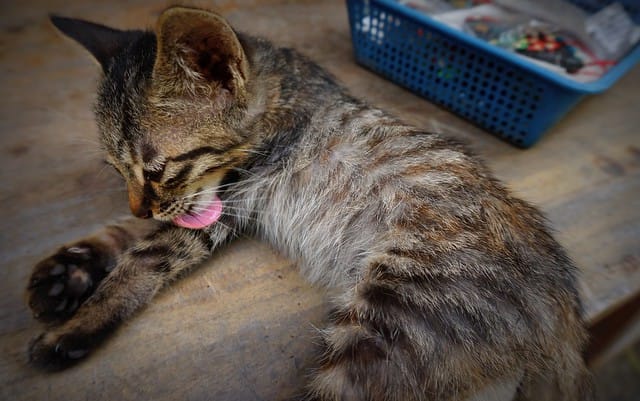
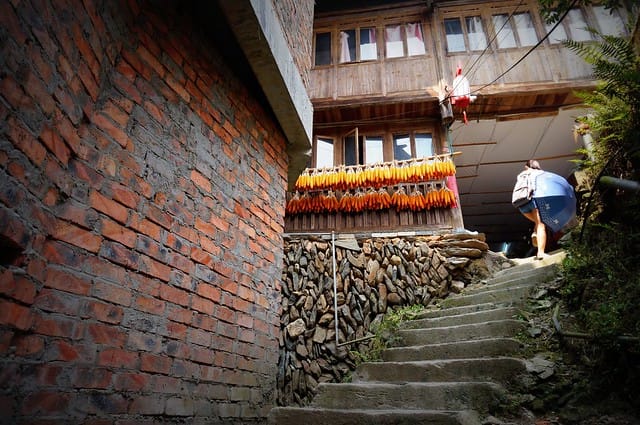
Getting There Without Growing Grey Hair
Step 1: Guilin → Longsheng Bus Station
Hourly buses (07:00–19:00) from Guilin Qintan Bus Station. 35 RMB, 1 h 45 m.
Step 2: Longsheng → Ping’AnMinivans park opposite bus station; drivers wait until 6–7 seats filled. 15 RMB, 50 m along those snake-like corniche roads.
You’ll be dropped at the scenic-area gate; pay 80 RMB entrance, then shuttle another 20 m up to trailhead.
Motion sickness hack: Sit front-left and focus on tea-terrace horizons; peppermint oil helps.
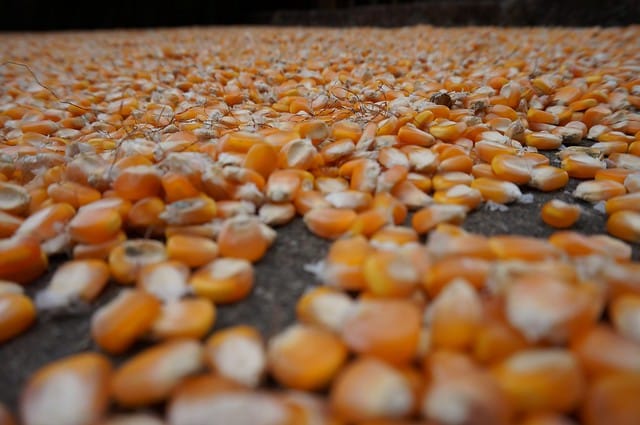
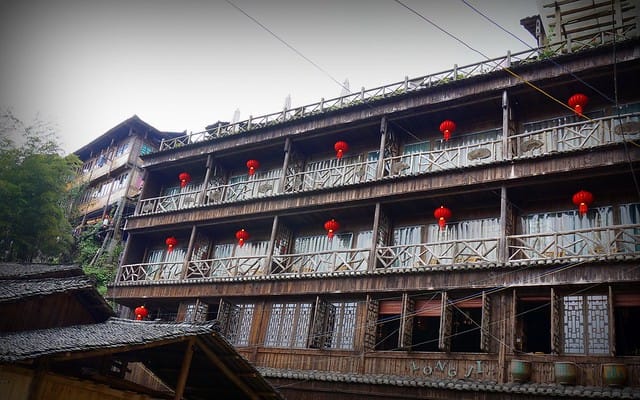
Sleep Among the Terraces – Best Guesthouse Picks
| Name | Location | Why Book | Price (dbl) |
|---|---|---|---|
| Countryside Villa | Just above Ping’An square | Pan-terrace balcony, piping-hot solar showers | ¥230 |
| Li-An Lodge | Between viewpoints No.1 & 2 | Boutique, hand-painted calligraphy rooms, telescope for star-gazing | ¥680 |
| Tiantouzhai Dragon Den | Mid-way Dazhai hike | Budget dorms, free noodle-making class nightly | ¥90 bunks / ¥220 priv |
All list on WeChat Mini-Program or Booking.com, but call ahead if arriving after 18:00 – roads close to private cars at dusk and hosts must meet you at shuttle stop.
Fuel Your Trek – What & Where to Eat
Bamboo-tube rice (竹筒饭 zhútǒngfàn) – Sticky rice mixed with cured pork, shiitake and taro, stuffed into a fresh bamboo cylinder and roasted over charcoal. Available at trail kiosks; costs about 20 RMB.
Laozao Wine Soup – Sweet fermented-rice porridge topped with poached egg; ultimate breakfast carb-boost.
Smoked Chili Duck – Ping’An specialty; order before hike, devour at sunset with Tsingtao beer.
Wild mountain-herb tea – Granny vendors pour from battered kettles for 3 RMB a cup; actually re-hydrates better than bottled water.
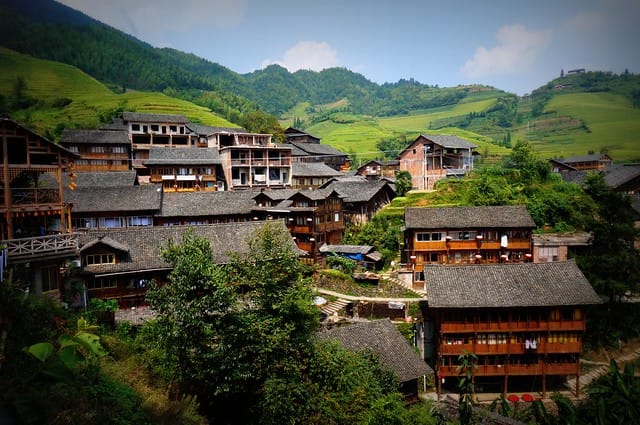
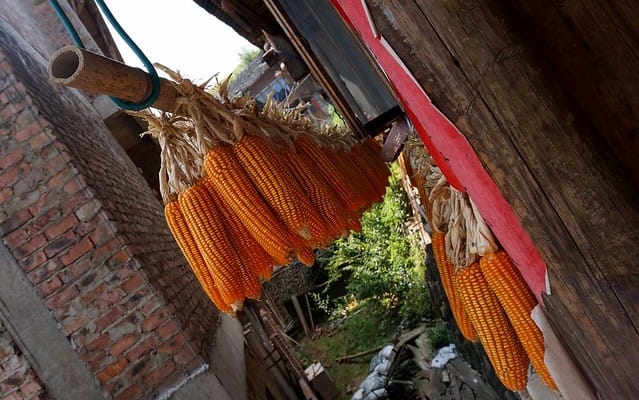
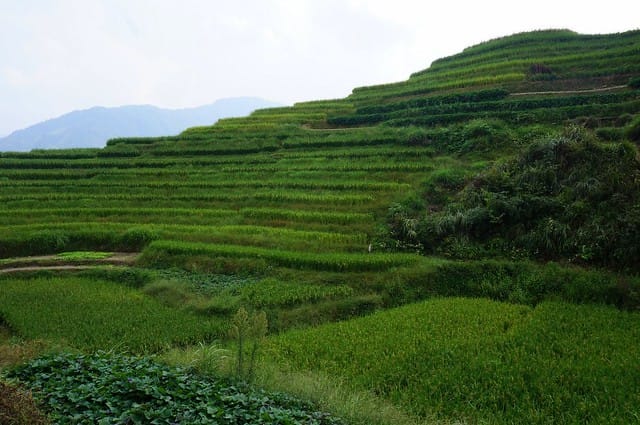
Vegetarian? Ask for “su-shi” (素食) dishes—stir-fried fern heads and pumpkin leaves are delicious.
Cultural Nuggets to Appreciate
Zhuang minority make up 60 % of Ping’An’s residents. Their wooden stilt houses (diaojiaolou) are assembled without nails—earthquake flexibility perfected centuries ago.
Red Yao women (you met their cousins in Huangluo) still wash Rapunzel-length hair in fermented rice water here too; if you notice locks drying on balcony rails, it’s polite not to photograph them directly.
Drum Towers & Wind-Rain Bridges you spot en route are both social hubs and architectural lightning rods—built to funnel storms away from fields.
Understanding these layers turns a “pretty terrace” walk into living anthropology.
Pack List for a Day on the Dragon’s Back
| Essential | Why |
|---|---|
| Convertible hiking pants | Scrub-free mornings, sun-scorched afternoons – zip off legs save overheating. |
| Micro-spikes or sturdy trainers | Stone steps slick after irrigation; flip-flops = comedy wipe-outs. |
| Quick-dry towel | Post-hike guesthouse showers sometimes charge ¥5 towel fee. |
| Cash | No ATMs in villages; snacks + homestays take notes only. |
| UV umbrella | Locals’ secret weapon; doubles as rain shield. |
| Headtorch | Power cuts common; helpful for sunrise climbs at 4 a.m. |
| Light gift | Pens, nail polish, or postcards to thank hosts (not sweets—dental care limited). |
A Two-Day Sample Itinerary
Day 1
09:30 Arrive Ping’An, drop bag at guesthouse
10:00 Bamboo rice brunch, hike to Nine Dragons viewpoint
13:00 Continue to Seven Stars With Moon, circle back via tea fields
17:30 Golden-hour shoot from Guesthouse balcony
19:00 Smoked duck + taro hotpot dinner, early bed
Day 2
04:45 Head-torch climb for sunrise timelapse
08:00 Laozao breakfast, pack-out
09:00 Minivan to Dazhai; cable-car up, 3-hour traverse across Jinkeng bowl
15:00 Soak feet in river at Tiantouzhai, bus back to Guilin or stay extra night for star-trails photography
FAQs: Ping’An & the Longji (Longsheng) Rice Terraces
1) When’s the best time to visit Longji?
Late Apr–Jun = mirror-like flooded fields and neon seedlings; Jul–Aug = lush green “dragon scales”; Sep–Oct = golden harvest (most photogenic); Nov = misty, rustic reds; Dec–Feb = quiet, occasional frost/snow. Avoid China’s Golden Week if you dislike crowds.
2) How do I get to Ping’An from Guilin/Yangshuo?
From Guilin, take a bus to Longsheng, then a minivan/shuttle to the Longji Scenic Area gate and on to Ping’An (or Dazhai/Tiantouzhai). From Yangshuo, most travellers connect via Guilin or join a direct tour/minivan.
3) Do I need a ticket for the terraces?
Yes. The Longji Rice Terraces Scenic Area requires an entrance ticket; internal shuttles cost extra. Keep your ticket handy for village shuttle checks.
4) Ping’An vs. Dazhai/Tiantouzhai—where should I base?
Ping’An = classic views, shorter loops, more eateries. Dazhai/Tiantouzhai = wider amphitheatre vistas, a cable car, longer hikes, slightly fewer crowds. Both have atmospheric wooden guesthouses.
5) What are the best viewpoints near Ping’An?
Two classics: Nine Dragons & Five Tigers (grand S-curves) and Seven Stars with Moon (terraces clustered like a constellation). Sunrise and late afternoon are ideal for light and shadows.
6) Are the hikes difficult?
Trails are stone-stepped and well-signed. Ping’An loops are easy–moderate (2–4 hours). Cross-village routes (e.g., Dazhai ↔ Tiantouzhai) are moderate (4–6 hours). Steps can be slick after rain—wear good shoes.
7) How many days do I need?
1 day covers Ping’An’s two viewpoints. 2 days adds sunrise/sunset and a loop or side trip. 3 days lets you combine villages (Ping’An + Dazhai) at a relaxed pace.
8) What should I pack for a day on the terraces?
Grippy footwear, sunhat/UV umbrella, rain shell, water/snacks, small bills (no ATMs in villages), headlamp (pre-dawn starts/power cuts), and layers—mountain weather flips fast.
9) What local foods should I try?
Bamboo-tube rice (zhútǒngfàn), laozao sweet rice-wine soup, smoked chili duck, wild mountain-herb stir-fries, and taro hotpot. Veggie? Ask for sùshí (素食) options—pumpkin leaves and fern tips are great.
10) Any lodging tips?
Guesthouses are wooden stilt homes with big views; book ahead for summer/harvest and national holidays. If arriving late, arrange pickup at the shuttle stop (private cars are restricted in the scenic area).
11) Are the roads and shuttles safe?
Drivers know the mountain switchbacks, but motion sickness is common—sit forward, look at the horizon, bring mints/meds. Steps around paddies can be muddy—watch your footing.
12) Any photography & etiquette advice?
Golden/blue hour sings; carry a mini tripod. Ask before photographing locals (especially hair-care rituals of Red Yao women). Drones may be restricted—check current rules and fly responsibly away from crowds and crops.

Great pictures, Audrey 🙂
Thank you!
As usual you do not disappoint with fabulous photos and your descriptions. Thanks
I can certainly see why! You captured Ping’An beautifully. Thanks for sharing.
Happy travels 🙂
Thanks Lauren. 🙂
It seems really odd to see corn in China. Not sure why. As for the Chinese characters…I can tell you the one with three horizontal lines is the number 3. That is the extent of my wisdom for today.
Haha, thanks for translating that character for me! You’re practically fluent in my books. 😉
The Chinese: 此地无银三百两
How to read it: Cǐ dì wú yín sān bǎi liǎng
What it means:
I’ll translate character-by-character so y’all can enjoy piecing together the meaning.
此 = this
地 = ground/place
无 = (is) without/doesn’t have
银 = silver
三 = three
百 = hundred
两 = Liang. A traditional unit of weight, equivalent to 50grams or 1.763 ounces.
Beyond the meaning: This is a reference to a tale where a clever individual buries his fortune then, to prevent anyone suspecting treasure may be buried here, erects a sign that reads “此地无银三百两”.
I would love climb the rice terraces, I am sure the view up there is splendid. I heard that the famous Dragon’s backbone rice terraces are found in this town.
It’s a great feeling to see that you guys have been to exactly the same places we had gone in May. The village has not changed at all since we saw it and it’s still so beautiful!
That’s because I read your posts for a bit of China travel inspiration. 😉 “Hmm, where did Agness and Cez go that looks good?” I also wanted to visit Fenghuang until I saw how far it was. I’ll hopefully save that for another time.
This looks like a truly special place. You are so blessed, Audrey!
I do feel blessed. The whole time I was in China I just kept repeating myself, “Look at this! I can’t believe we’re in China!!!” 🙂
These photos are wonderful! Your posts really make me want to travel China more thoroughly and explore the smaller towns.
I wasn’t sure what to expect from China, but I really enjoyed my brief visit to the southwestern part. I definitely want to go back in search of more little towns. 😉
SImply Stunning – I’d be hard pressed to leave such a beautiful area. Wow!
I really wish I’d had more time in China. While I didn’t enjoy the big cities, once I was out in the countryside visiting the smaller villages, it really was an enjoyable trip. 🙂
That looks absolutely stunning. Being back in Asia makes me realized that I miss being around rice fields and this one is definitely amazing!
Nothing like green rice fields to soothe the soul. 🙂
This looks like a charming and quiet place, to be visited without a hurry. The drive to get there sounds scary, though!
Most drives in Asia have been terrifying – especially when you have winding roads and a drop on the one side.
I love little Chinese towns! We saw a lot of corn drying in Yunnan, too, but couldn’t figure out why. Animal feed perhaps? That sign might be a store name and address. Two of the top characters are for ‘earth’ and ‘silver’ while the bottom ones read ‘three hundred two’.
Ooo, thanks for translating! I’m impressed by your skills! 😉
I would have stopped halfway too – that town looks super charming! So much corn!
I didn’t realize there was so much corn until I started going back through my pictures. 😉
There’s rarely a bus ride in Asia where I’m not closing my eyes and griping the seat in front of me. From Hong Kong to Thailand and even in Japan, all the drivers I get seem to think they’re pro and love to play chicken!
Also, it’s so weird to see corn since we don’t have any here in HK!
I love the look of this village. Still looks so traditional. Reminds me of the hilltribe villages in Nepal.
They also reminded me a bit of the hill tribes I met in Sapa, which are quite close to the border with China. 🙂
Absolutely stunning! Your posts makes me feel like i can fly to my dream country China
Thanks Jeff.
That looks awesome! I love the picture of the guys walking with the chair.
looks awesome! I love all these little towns. Would love to see the village with the longest haired women too
If you ever go back stay in Tian Tou Zhai instead. This place is a beautiful hike up through the rice terraces and was an amazing place to stay. I think you could walk here from Ping’An but we had a storm a day while we were there which stopped us from trying out the path. This was one of my favourites places I visited when I spent a year in China.